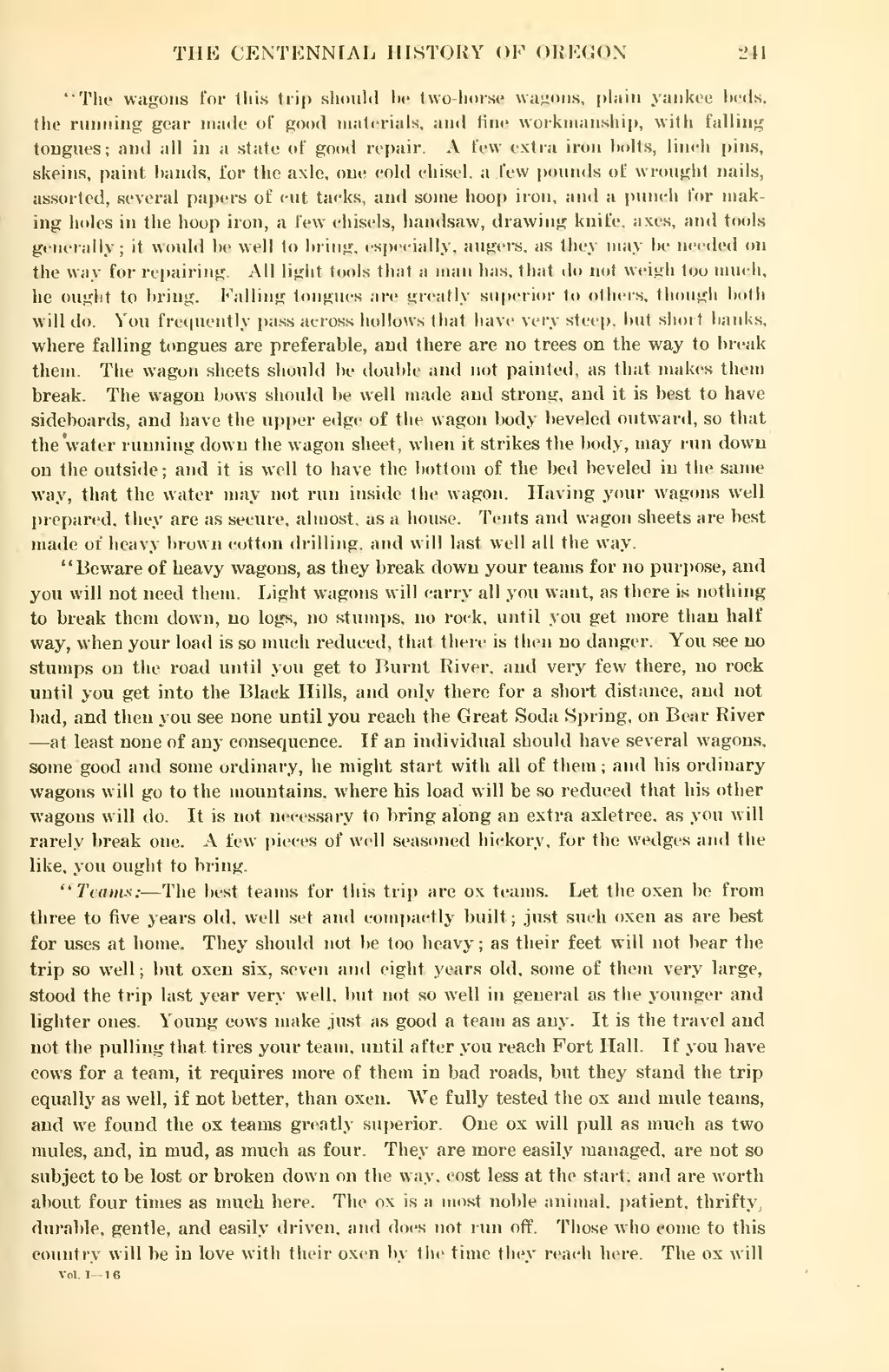"The wagons for this trip should be two-horse wagons, plain yankee beds, the running gear made of good materials, and fine workmanship, with falling tongues; and all in a state of good repair. A few extra iron bolts, linch pins, skeins, paint bands, for the axle, one cold chisel, a .few pounds of wrought nails, assorted, several papers of cut tacks, and some hoop iron, and a punch for making holes in the hoop iron, a few chisels, handsaw, drawing knife, axes, and tools generally; it would be well to bring, especially, augers, as they may be needed on the way for repairing. All light tools that a man has, that do not weigh too much, he ought to bring. Palling tongues are greatly superior to others, though both will do. You frequently pass across hollows that have very steep, but short banks, where falling tongues are preferable, and there are no trees on the way to break them. The wagon sheets should be double and not painted, as that makes them break. The wagon bows should be well made and strong, and it is best to have sideboards, and have the upper edge of the wagon body beveled outward, so that the water running down the wagon sheet, when it strikes the body, may run down on the outside; and it is well to have the bottom of the bed beveled in the same way, that the water may not run inside the wagon. Having your wagons well prepared, they are as secure, almost, as a house. Tents and wagon sheets are best made of heavy brown cotton drilling, and will last well all the way.
"Beware of heavy wagons, as they break down your teams for no purpose, and you will not need them. Light wagons will carry all you want, as there is nothing to break them down, no logs, no stumps, no rock, until you get more than half way, when your load is so much reduced, that there is then no danger. You see no stumps on the road until you get to Burnt River, and very few there, no rock until you get into the Black Hills, and only there for a short distance, and not bad, and then you see none until you reach the Great Soda Spring, on Bear River — at least none of any consequence. If an individual should have several wagons, some good and some ordinary, he might start with all of them; and his ordinary wagons will go to the mountains, where his load will be so reduced that his other wagons will do. It is not necessary to bring along an extra axletree, as you will rarely break one. A few pieces of well seasoned hickory, for the wedges and the like, you ought to bring.
"Teams:— The best teams for this trip are ox teams. Let the oxen be from three to five years old, well set and compactly built; just such oxen as are best for uses at home. They should not be too heavy; as their feet will not bear the trip so well; but oxen six, seven and eight years old, some of them very large, stood the trip last year very well, but not so well in general as the younger and lighter ones. Young cows make just as good a team as any. It is the travel and not the pulling that tires your team, until after you reach Fort Hall. If you have cows for a team, it requires more of them in bad roads, but they stand the trip equally as well, if not better, than oxen. We fully tested the ox and mule teams, and we found the ox teams greatly superior. One ox will pull as much as two mules, and, in mud, as much as four. They are more easily managed, are not so subject to be lost or broken down on the way, cost less at the start; and are worth about four times as much here. The ox is a most noble animal, patient, thrifty, durable, gentle, and easily driven, and does not run off. Those who come to this country will be in love with their oxen by the time they reach here. The ox will
